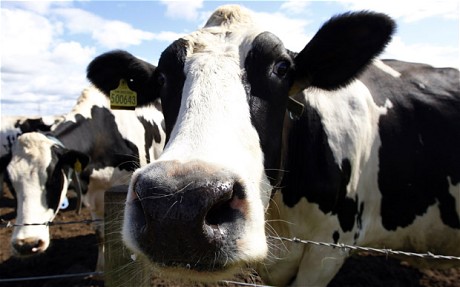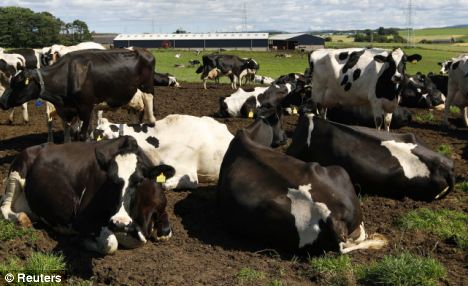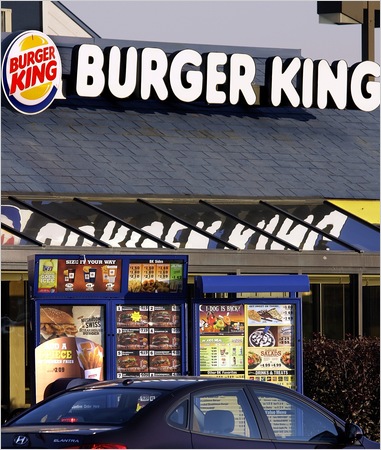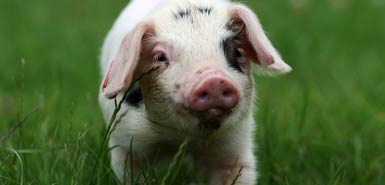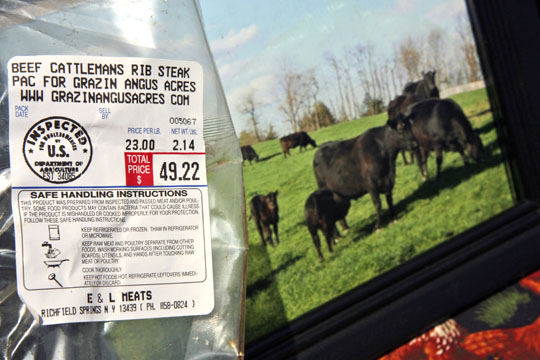Meat
US: Almost Half Of Meat In Stores Contaminated With Strains Of Drug-Resistant Bacteria
47% of samples tested had the type of bacteria that most commonly causes staph infections. Food animals routinely fed antibiotics are a possible source.
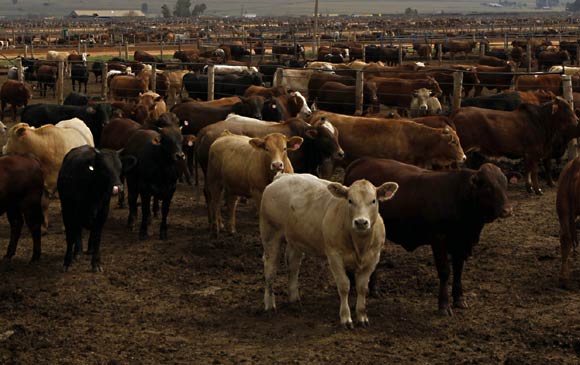
The use of antibiotics should be curtailed in the agriculture industry, the author of a new study on staph in the food supply says. (Siphiwe Sibeko / Reuters)
Meat in the U.S. may be widely contaminated with strains of drug-resistant bacteria, researchers reported Friday after testing 136 samples of beef, chicken, pork and turkey purchased at grocery stores.
Nearly half of the samples — 47% — contained strains of Staphylococcus aureus, the type of bacteria that most commonly causes staph infections. Of those bacteria, 52% were resistant to at least three classes of antibiotics, according to a study published in the journal Clinical Infectious Diseases.
DNA testing suggested the animals were the source of contamination. Environmental health scientist Lance Price, the study’s leader, said the animals most likely harbored these drug-resistant pathogens because antibiotics routinely are fed to livestock to promote growth and prevent disease in crowded pens on large farms.
“These findings really point to serious problems with the way food animals are raised in the U.S. today,” said Price, who directs the Center for Food Microbiology and Environmental Health at the Translational Genomics Research Institute, a nonprofit biomedical research center in Phoenix.
Read moreUS: Almost Half Of Meat In Stores Contaminated With Strains Of Drug-Resistant Bacteria
EU: Let them Eat Cloned Food! (No Labelling Required!)
The majority of the people don’t want cloned food, but who cares?
– Meat from offspring of cloned animals to go on sale in UK (Telegraph):
Meat and milk from the offspring of cloned animals could be on sale in British supermarkets by the end of the summer, after attempts to impose controls through European regulation failed.
Families buying meat for barbecues are unlikely to be aware of their food’s controversial links because the labels on packaging will be no different from normal meat.
– EU move on cloned food shunned (UPI):
Europe says no to cloned food labels”Meat from the offspring of cloned animals could find its way onto the EU market, with no one being any the wiser, after member state representatives refused the Parliament’s demand to label clone-derived products,” the European Parliament said in a statement.
– UK accused over food labelling (Press Association):
The Government has been accused of ignoring consumer wishes by blocking moves to label meat and milk products which have genetic links to cloned animals.
The prospect of EU-wide rules introducing compulsory labelling ended early on Tuesday when last-ditch talks between Euro-MPs, the European Commission and officials representing Europe’s governments ended without agreement.
The commission and member states feared a trade war with Washington if tougher controls came in to highlight produce from the offspring of cloned animals.
Read moreEU: Let them Eat Cloned Food! (No Labelling Required!)
German Dioxin Scare Spreads to Meat
Germany’s poisoned eggs scare has spread to chickens, with investigators now reporting increased levels of cancer-causing dioxin in meat.
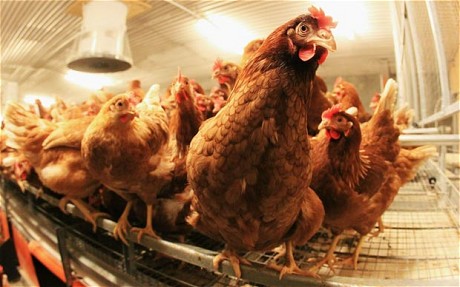
The meat scare follows on from last week’s admission that tainted eggs from chickens that ate feed contaminated with dioxins had entered the UK food chain Photo: GETTY
Three chickens – out of 15 samples of chicken, turkey and pork sent to the EU Commission – showed a dioxin concentration twice as high as the legal level, it was admitted on Sunday.
The spokesman said the chicken meat had not been sold and that eating it “would not have been harmful in the short term since the contamination levels were so low”.
The meat scare follows on from last week’s admission that tainted eggs from chickens that ate feed contaminated with dioxins had entered the UK food chain.
Close to 5,000 farms have been shut across Germany and thousands of chickens culled after feed from a chemical company near Hamburg was tainted.
EU to Back Sale of Meat And Milk From Cloned Animals
Related articles:
– Europe: Meat From Cloned Animals to Enter The Food Chain ‘Through An Open Door’
A new report suggests that the offspring of cloned animals could be consumed
The sale of meat and milk from the offspring of cloned farm animals is set to be backed by EU Commissioners despite mass consumer opposition.
A huge majority of the public is against clone animal farming, according to studies in Britain and across Europe.
Concerns surround the ethics of the process, the welfare of the animals and a lack of research on food safety. However, a leaked report to be discussed by the EU’s College of Commissioners today comes out in favour of food from the offspring of clones.
Alarmingly, it appears this food would not have to be labelled, leaving families completely in the dark about what they are putting in their mouths.
Specifically, the report proposes a temporary five-year ban on the sale of meat and milk from clones, but there would be no ban on food from their offspring.
If this policy is adopted, European farms could be populated by cloned supersize animals used as breeding stock for cows, pigs and sheep that are reared for food.
Clones themselves can suffer a range of painful conditions, including malformed organs and gigantism. Many die in the womb or soon after birth.

What’s in your shopping bag? The Daily Mail revealed how meat from two clone-offspring bulls and one veal calf had been sold in butcher shops in Scotland, North-East England, London and Belgium
But the Commission and the Government take the view that meat and milk from the offspring of a clone is effectively normal and therefore no ban or labelling is required.
The Daily Mail revealed in the summer that more than 100 cattle – pedigree Holstein milking cows – which are the offspring of clones are being raised on British farms.
We also revealed how meat from two clone-offspring bulls and one veal calf had been sold in butcher shops in Scotland, North-East England, London and Belgium.
The Food Standards Agency has made clear it believes it is illegal to sell meat and milk from these sources without first getting its approval.
Read moreEU to Back Sale of Meat And Milk From Cloned Animals
60 Percent of Pigs in Slaughterhouses Contaminated With MRSA
One in ten pigs gets the MRSA bacterium in livestock transport trucks, while sixty percent of pigs in slaughterhouses have the bacterium. Wageningen University veterinary researcher Els Broens finds this ‘very disconcerting’.
Broens trailed 117 pigs from the farm to the slaughterhouse. She inspected them for the presence of MRSA before and after the journey to the slaughterhouse, and after they were sedated before the slaughter. While none of the pigs had MRSA before the journey, 10 percent of them tested MRSA-positive afterwards. After the sedation in the slaughterhouse, the bacterium was found in sixty percent of the pigs. This research work was carried out jointly by Wageningen UR, the National Institute for Public Health and the Environment (RIVM) and the Animal Health Service (GD).
Waiting area
The pigs en route and in the slaughterhouse were not infected with MRSA, implies Broens. ‘The resistant bacterium was lodged in their noses but infection did not take place.’ The livestock trucks were cleaned after every journey. The animal waiting areas in the slaughterhouse were cleaned daily, but not throughout the day. Therefore, one batch of pigs could have infected another. In contaminated livestock trucks, twenty percent of the pigs became contracted the bacterium. In trucks which were not contaminated, no such cases occurred.
Read more60 Percent of Pigs in Slaughterhouses Contaminated With MRSA
Europe: Meat From Cloned Animals to Enter The Food Chain ‘Through An Open Door’
Cloned meat: Britain and Europe set for another clash
Europe is allowing meat from cloned animals to enter the food chain “through an open door”, according to MEPs.

Demonstrators wearing masks depicting Britain’s Prime Minister David Cameron, protest against cloning animals for food, in London Photo: REUTERS
They have called for an immediate measures to stop the importing of meat from America, South America or Japan without some safeguards or a new labelling regime put in place.
Their comments came after the European Commission reconfirmed this week that it believed meat, milk, cheese or any other product from the offspring of a cloned animal was perfectly legitimate and needed no special licence to be sold.This position puts Europe at direct loggerheads with the Food Standards Agency, whose board is meeting next week to discuss cloned animals.
The FSA has always stated that any products from the offspring of a cloned animal, even three generations down the line, had to have a licence before they can be sold.
The row between Europe and the FSA has been simmering after the FSA discovered last month that meat from the offspring of a cloned cow had been unwittingly sold in butcher’s shops in Britain, without a licence being obtained.
The discovery that such meat, for the first time had been eaten by consumers, triggered an often ill-tempered debate into the ethics of cloning animals.
Read moreEurope: Meat From Cloned Animals to Enter The Food Chain ‘Through An Open Door’
EU Seeks to Ban Foods From Cloned Animals
The European Parliament asked on Wednesday for a ban on the sale of foods from cloned animals and their offspring, the latest sign of deepening concern in the European Union about the safety and ethics of new food technologies.
The chamber, meeting in Strasbourg, France, also called for a temporary suspension of the sale of food containing ingredients derived from nanotechnology, which involves engineering substances down to very small sizes. Members were voting on legislation that would have regulated the sale of foods based on new production processes, including cloning. That legislation would have required companies to ask permission to market food derived from cloned animals.
But the chamber rejected that plan and instead called for separate legislation on cloning because of potential problems with the technology and concerns about animal cruelty.
“Although no safety concerns have been identified so far with meat produced from cloned animals, this technique raises serious issues about animal welfare, reduction of biodiversity, as well as ethical concerns,” said Corinne Lepage, a French member of the European Parliament.
Contaminated beef containing harmful pesticides, veterinary antibiotics and heavy metals sold to the public
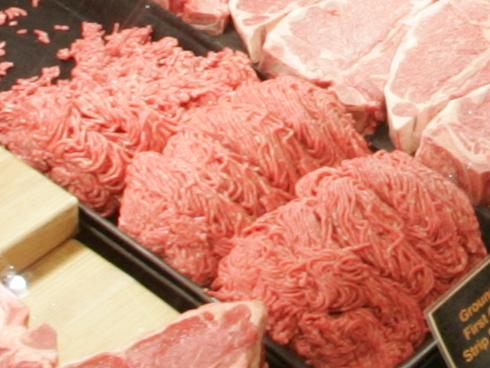
Beef containing harmful pesticides, veterinary antibiotics and heavy metals is being sold to the public because federal agencies have failed to set limits for the contaminants or adequately test for them, a federal audit finds.
WASHINGTON – Beef containing harmful pesticides, veterinary antibiotics and heavy metals is being sold to the public because federal agencies have failed to set limits for the contaminants or adequately test for them, a federal audit finds.
A program set up to test beef for chemical residues “is not accomplishing its mission of monitoring the food supply for … dangerous substances, which has resulted in meat with these substances being distributed in commerce,” says the audit by the U.S. Department of Agriculture’s Office of Inspector General.
The health effects on people who eat such meat are a “growing concern,” the audit adds.
The testing program for cattle is run by the USDA’s Food Safety and Inspection Service (FSIS), which also tests meat for such pathogens as salmonella and certain dangerous strains of E. coli. But the residue program relies on assistance from the Environmental Protection Agency, which sets tolerance levels for human exposure to pesticides and other pollutants, and the Food and Drug Administration, which does the same for antibiotics and other medicines.
DOCUMENTS: Read the audit report
Scientists turn stem cells into pork (Ugh!)
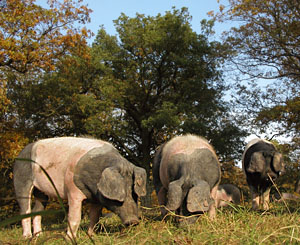
Pigs raised under oak and beech trees produce the best ham.
But maybe you want to try the lab ‘Petri dish pork’ instead???
LONDON — Call it pork in a Petri dish — a technique to turn pig stem cells into strips of meat that scientists say could one day offer a green alternative to raising livestock, help alleviate world hunger, and save some pigs their bacon.
Dutch scientists have been growing pork in the laboratory since 2006, and while they admit they haven’t gotten the texture quite right or even tasted the engineered meat, they say the technology promises to have widespread implications for our food supply.
“If we took the stem cells from one pig and multiplied it by a factor of a million, we would need one million fewer pigs to get the same amount of meat,” said Mark Post, a biologist at Maastricht University involved in the In-vitro Meat Consortium, a network of publicly funded Dutch research institutions that is carrying out the experiments.
Post describes the texture of the meat as sort of like scallop, firm but a little squishy and moist. That’s because the lab meat has less protein content than conventional meat.
Several other groups in the U.S., Scandinavia and Japan are also researching ways to make meat in the laboratory, but the Dutch project is the most advanced, said Jason Matheny, who has studied alternatives to conventional meat at the Johns Hopkins Bloomberg School of Public Health in Baltimore and is not involved in the Dutch research.
Injecting Beef With Ammonia; Safety of Beef Processing Method Is Questioned
Carl S. Custer, a former U.S.D.A. microbiologist, said he and other scientists were concerned that the department had approved the treated beef for sale without obtaining independent validation of the potential safety risk. Another department microbiologist, Gerald Zirnstein, called the processed beef “pink slime” in a 2002 e-mail message to colleagues and said, “I do not consider the stuff to be ground beef, and I consider allowing it in ground beef to be a form of fraudulent labeling.”
Toxic zombie food!
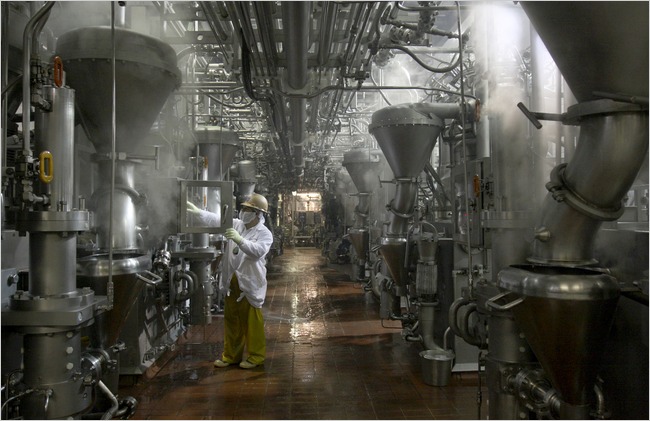
A Beef Products Inc. processing plant in South Sioux City, Neb. The company injects fatty beef trimmings with ammonia to remove E. coli and salmonella.
Both McDonald’s and Burger King use Beef Products’ processed beef as a component in ground beef.
Eight years ago, federal officials were struggling to remove potentially deadly E. coli from hamburgers when an entrepreneurial company from South Dakota came up with a novel idea: injecting beef with ammonia.
The company, Beef Products Inc., had been looking to expand into the hamburger business with a product made from beef that included fatty trimmings the industry once relegated to pet food and cooking oil. The trimmings were particularly susceptible to contamination, but a study commissioned by the company showed that the ammonia process would kill E. coli as well as salmonella.
Officials at the United States Department of Agriculture endorsed the company’s ammonia treatment, and have said it destroys E. coli “to an undetectable level.” They decided it was so effective that in 2007, when the department began routine testing of meat used in hamburger sold to the general public, they exempted Beef Products.
With the U.S.D.A.’s stamp of approval, the company’s processed beef has become a mainstay in America’s hamburgers. McDonald’s, Burger King and other fast-food giants use it as a component in ground beef, as do grocery chains. The federal school lunch program used an estimated 5.5 million pounds of the processed beef last year alone.
But government and industry records obtained by The New York Times show that in testing for the school lunch program, E. coli and salmonella pathogens have been found dozens of times in Beef Products meat, challenging claims by the company and the U.S.D.A. about the effectiveness of the treatment. Since 2005, E. coli has been found 3 times and salmonella 48 times, including back-to-back incidents in August in which two 27,000-pound batches were found to be contaminated. The meat was caught before reaching lunch-rooms trays.
Read moreInjecting Beef With Ammonia; Safety of Beef Processing Method Is Questioned
Scientists grow pork meat in a laboratory for the first time
Bon appétit!
SCIENTISTS have grown meat in the laboratory for the first time. Experts in Holland used cells from a live pig to replicate growth in a petri dish.
The advent of so-called “in-vitro” or cultured meat could reduce the billions of tons of greenhouse gases emitted each year by farm animals – if people are willing to eat it.
So far the scientists have not tasted it, but they believe the breakthrough could lead to sausages and other processed products being made from laboratory meat in as little as five years’ time.
They initially extracted cells from the muscle of a live pig. Called myoblasts, these cells are programmed to grow into muscle and repair damage in animals.
The cells were then incubated in a solution containing nutrients to encourage them to multiply indefinitely. This nutritious “broth” is derived from the blood products of animal foetuses, although the intention is to come up with a synthetic solution.
The result was sticky muscle tissue that requires exercise, like human muscles, to turn it into a tougher steak-like consistency.
“You could take the meat from one animal and create the volume of meat previously provided by a million animals,” said Mark Post, professor of physiology at Eindhoven University, who is leading the Dutch government-funded research.
Read moreScientists grow pork meat in a laboratory for the first time
Video shows shocking farm cruelty to pigs
UNDERCOVER animal activists have filmed horrific scenes of cruelty to farm pigs.
The incidents include workers slamming piglets on floors and leaving them still wriggling to die, beating animals to death with metal rods and inserting rods into sows’ hindquarters.
Activists from People for the Ethical Treatment of Animals (PETA) posed as workers between June and September this year at a farm in the midwestern US state of Iowa, the Associated Press (AP)reports.
Huge rise in the price of food
Supermarket food prices are soaring, with the price of key items rising at several times the rate of inflation, figures show.

The rising cost of the shopping basket
The price of fresh food has risen by 12 per cent since the start of the year, while meat and fish now costs 23 per cent more on average. Meanwhile chicken and ham have risen by 42 and 45 per cent since January, placing the former staples out of many consumers’ price range.
The rises in the price of both basic pasta and basmati rice have also smashed through the 40 per cent barrier.
Even so-called slump proof tinned foods have registered a price rise of 15 per cent – more than three times the Government’s official inflation rate of 4.4 per cent.
US food prices to post biggest rise since ’90, says USDA
WASHINGTON, Aug 20 (Reuters) – U.S. consumers should brace for the biggest increase in food prices in nearly 20 years in 2008 and even more pain next year due to surging meat and produce prices, the Agriculture Department said on Wednesday.
Food prices are forecast to rise by 5 percent to 6 percent this year, making it the largest annual increase since 1990. Just last month, USDA forecast food prices would climb between 4.5 and 5.5 percent in 2008.
Read moreUS food prices to post biggest rise since ’90, says USDA
US: The Cattle Industry Is Struggling To Survive
Beef prices are likely to increase as rising food and fuel prices threaten many cattle ranches
The American beef industry is in trouble. Though the financial strain of rising fuel and food prices is being widely felt across the U.S. economy, the livestock industry, which consumes about 5 billion bushels of corn annually, is suffering more than most.
Feedlot operators, who fatten their animals on corn before sending them to a slaughterhouse, are losing $150 a head with corn prices near record levels because of demand for corn-based ethanol. In Texas, the country’s largest beef-producing state, a quarter of the once-packed feedlot space is unoccupied. Some operations are shutting their doors, and “liquidation”-the culling of herds-has become a frequent escape hatch for the seriously struggling.
